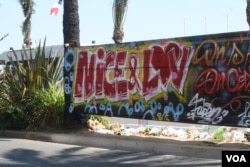The Paris prosecutor said Thursday that the man who drove a truck through crowds celebrating Bastille Day in Nice, killing 84 people, had accomplices and seemed to have been plotting his attack for months.
Francois Molins told reporters in Paris that information from the attacker's phone showed searches and photos suggesting he could have been preparing an attack as far back as 2015.
Molins said five suspects in custody were facing preliminary terrorism charges, including complicity to murder and possessing weapons, for their alleged roles in helping the perpetrator carry out the attack July 14.
He identified the suspects as four men — two Franco-Tunisians, a Tunisian and an Albanian — and one woman of dual French-Albanian nationality. Intelligence services did not know any of them, according to the the French news agency AFP.
The truck driver, Mohamed Lahouaiej Bouhlel, 31, was a Tunisian who had been living in Nice for several years.
Earlier in the day, French police conducted a counterterrorism operation in the Argenteuil area north of Paris near a mosque and an Islamic library, authorities said. It wasn't known whether the operation had any links to last week's truck attack in Nice.
No police presence
Meanwhile, France's interior minister said there were no national police stationed at the entrance to the walkway in Nice when the Bastille Day truck attack took place.
Bernard Cazeneuve's acknowledgement Thursday came as a newspaper accused French authorities of a lack of transparency for their handling of the massacre.
Cazeneuve had said, in a speech two days after the July 14 attack, that national police were "very present on the Promenade des Anglais” and suggested that their cars were blocking the pedestrian sidewalk entrance,
Cazeneuve launched an internal police probe into security measures taken for the Bastille Day celebrations in Nice shortly after Thursday's backtrack.
Speaking from Dublin where he met the Irish prime minister, French President Francois Hollande said the conclusions of the investigation would be known next week.
Hollande said that any police “shortfalls” would be carefully looked into, but he defended French authorities against the media attacks, saying that “there is no room for polemics, there is only room for transparency.”
His comments came in response to French newspaper Libération's accusations that Cazeneuve had lied about the presence of the national police officers and cars, and that authorities lacked transparency about the attack.
In a related development, France's lawmakers voted Wednesday to extend the state of emergency for another six months, continuing greater police search-and-arrest powers without advance clearance from judges.
Speaking in the lower house of parliament, French Prime Minister Manuel Valls said that the fight against terrorism would be long and difficult, and he warned against social divisions that could affect Muslim citizens.
"We must protect all our compatriots," Valls said. "We should of course also protect our Muslim compatriots, the co-citizens, the compatriots, co-citizens of Muslim culture, who today are also afraid and feel blamed, and who see the considerable damage not only from the attack, but also from what IS [Islamic State] is trying to do to fracture French society."
Some events canceled
Paris officials canceled some summer events, including open-air free movie showings and a car-free day on the city's famous Champs-Elysees boulevard.
No official list of those killed in the July 14 attack has been released, but it is known they included French, Americans, Germans, Ukrainians, Swiss, Tunisians, Poles and a Russian national.
Islamic State has claimed responsibility for the attack, although there is no evidence linking Bouhlel to the group.
France imposed emergency rule after the November 13, 2015, attacks carried out by Islamist militants that killed 130 people in Paris and left scores of others wounded.






